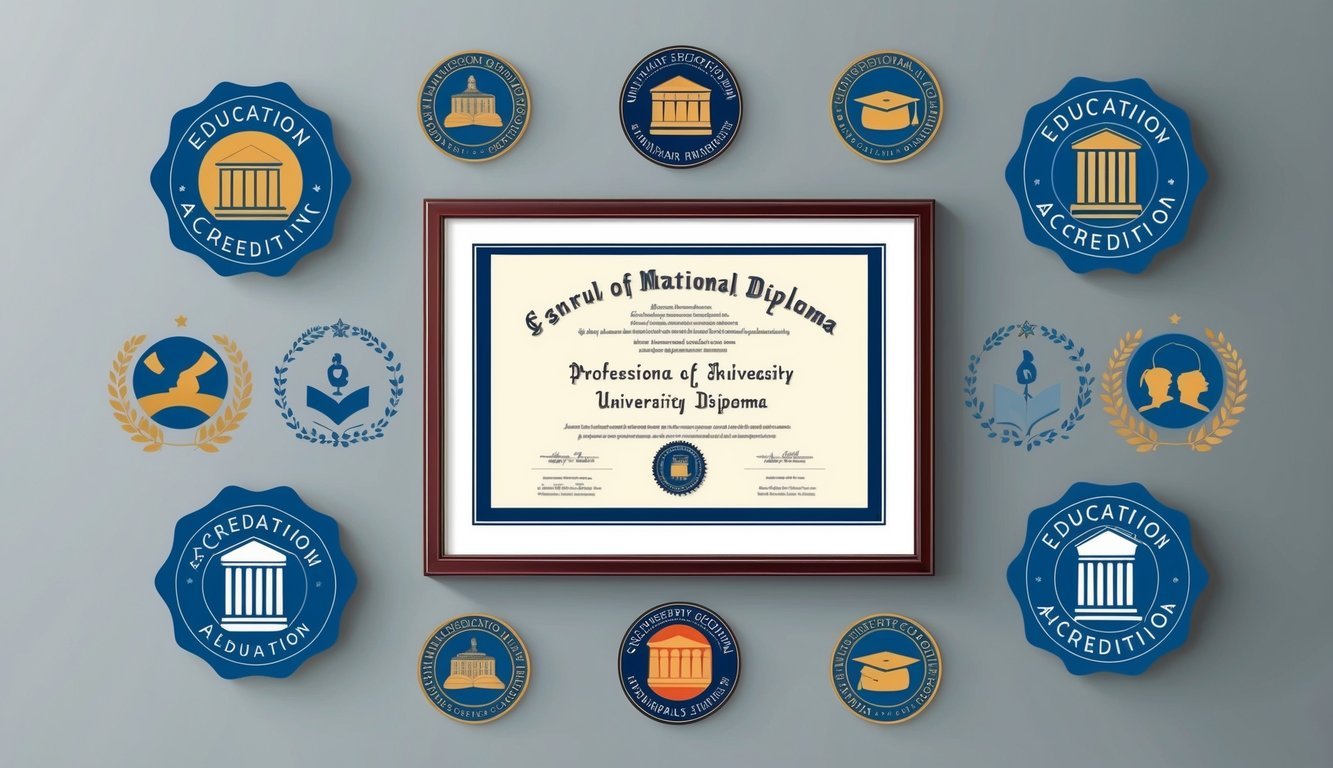RN to BSN programs in Florida help registered nurses enhance their education and career prospects.
These programs allow you to transition from an Associate’s degree to a Bachelor of Science in Nursing.
This transition significantly increases your job opportunities and potential salary.
With a growing demand for BSN-educated nurses in various healthcare settings, pursuing an RN to BSN can be a smart choice for your nursing career.
Many RN to BSN programs in Florida offer flexibility through online courses, making it easier for you to balance work and education.
Institutions like the University of Florida and Jacksonville University provide options that cater to working professionals.
These programs not only focus on advanced clinical skills, but also cover leadership, healthcare policy, and community health.
This ensures you are well-equipped for the evolving landscape of nursing.
As you consider your options, it’s essential to research different programs based on length, cost, and curriculum.
Investing in a BSN can open doors to leadership roles, specialized positions, and graduate education.
By enrolling in an RN to BSN program, you take a significant step forward in your nursing career.
Overview of RN to BSN Programs in Florida

RN to BSN programs are essential for registered nurses looking to advance their education and careers.
These programs provide a pathway for obtaining a Bachelor of Science in Nursing (BSN), enhancing both professional opportunities and earning potential.
Importance of BSN in Nursing
A Bachelor of Science in Nursing is increasingly recognized as a critical qualification in the healthcare field.
Many employers prefer or require a BSN for nursing positions, particularly in hospitals and healthcare settings that emphasize quality patient care.
Achieving a BSN equips you with advanced knowledge in areas such as healthcare policy, management, and community health.
Research indicates that nurses with a BSN often provide better patient outcomes and experience lower mortality rates in their facilities.
Moreover, obtaining a BSN opens pathways for further education, including master’s and doctoral programs.
This degree also prepares you for roles in administration, education, and public health, making it a versatile credential in your career progression.
Advantages of RN to BSN Programs
Participating in an RN to BSN program offers several key advantages.
Firstly, these programs are often designed for working nurses, with flexible schedules that accommodate your job and personal life.
Many institutions offer online or hybrid courses, which can greatly facilitate your education.
Additionally, RN to BSN programs usually build upon your existing nursing knowledge, allowing for a more streamlined learning experience.
Courses often cover essential topics such as leadership, advanced patient care, and evidence-based practice.
Another significant benefit is the potential for increased earning power.
According to industry reports, registered nurses with a BSN earn, on average, 10-20% more than those with only an associate degree.
This financial incentive, combined with comprehensive training, underscores why pursuing an RN to BSN program is a wise investment in your nursing career.
For more options, consider checking out resources like NursingProcess for a list of top RN to BSN programs in Florida.
Accreditation and Educational Standards

Accreditation is crucial in ensuring that RN to BSN programs meet specific educational benchmarks.
Understanding the role of the Commission on Collegiate Nursing Education (CCNE) and the requirements set by the Florida Board of Nursing will equip you with the information needed to select a quality program.
Understanding CCNE Accreditation
The Commission on Collegiate Nursing Education (CCNE) is a widely recognized accrediting body for nursing education programs.
CCNE accreditation denotes that a program meets high standards in terms of curriculum, faculty qualifications, and student outcomes.
When choosing a program, confirm whether it is CCNE accredited.
Accreditation influences the quality of education you receive and can impact your employability.
Programs with this accreditation often prepare you better for the Florida RN license requirements and ensure your education aligns with industry standards.
Check for CCNE accreditation here: CCNE Accreditation.
Florida Board of Nursing Requirements
The Florida Board of Nursing oversees the approval of nursing education programs in Florida.
Programs must meet strict criteria defined in Section 464.019 of the Florida Statutes.
This ensures that only high-quality programs are available to aspiring nurses.
To gain your Florida RN license, it’s crucial to attend an approved nursing program.
The board conducts periodic evaluations, focusing on curriculum effectiveness and faculty qualifications.
They do not conduct site visits but review programs’ compliance through submitted documentation.
For a complete list of approved nursing education programs, visit the Florida Board of Nursing: Florida Board of Nursing Education.
Understanding these standards will help you choose a program that provides a solid foundation for your nursing career.
Admission Requirements and Application Process
Understanding the admission requirements and application process is essential for aspiring students.
Each institution in Florida may have slightly different criteria and necessary materials for a smooth application experience.
Eligibility Criteria for Applicants
To qualify for RN to BSN programs in Florida, you typically need to meet certain criteria.
These generally include:
-
Active RN License: You must possess a valid and unencumbered registered nursing license in Florida or an equivalent.
-
Educational Background: A minimum of an Associate Degree in Nursing (ADN) from an accredited institution is usually required, with some programs specifying a GPA threshold, often around 2.5 to 3.0.
-
Work Experience: Some universities may also prefer candidates with professional nursing experience post-licensure.
-
Additional Tests: Certain programs may require standardized test scores, such as the TEAS or equivalent assessments. Institutions like the University of North Florida and Florida Atlantic University have specific criteria for applicants.
Materials Needed for Application
When applying to RN to BSN programs, you will need to submit various documents:
-
Application Form: Complete the online application, including necessary fees.
-
Official Transcripts: Provide transcripts from all colleges and universities previously attended, showcasing your academic history.
-
Letters of Recommendation: Some programs may ask for professional references attesting to your qualifications.
-
Personal Statement: A brief essay detailing your motivation and career goals may be requested by specific institutions.
-
Proof of RN License: Submit documentation of your active nursing license.
Ensure you check individual program requirements, particularly for schools like Jacksonville University and University of Florida, as they may vary.
Preparing these materials in advance can streamline your application process.
Program Curriculum and Structure

The curriculum for RN to BSN programs in Florida is designed to enhance your nursing knowledge and skills.
It covers essential theories, research, and practical experiences that prepare you for advanced nursing roles.
Coursework and Credit Hours
In a typical RN to BSN program, you can expect to complete around 30 to 60 credit hours depending on the institution and your previous coursework.
Core courses often include Population Health, Nursing Research, and Health Promotion.
Here’s a sample of common courses:
| Course Title | Credit Hours |
|---|---|
| Professional Nursing in the Evolving Healthcare | 3 |
| Pathophysiology and Pharmacology | 4 |
| Legal and Ethical Issues in Nursing | 2 |
| Clinical Reasoning: Health Assessment | 3 |
These courses are designed to build on your existing knowledge, enhancing your critical thinking and clinical judgment.
Clinical Requirements and Practical Experience
To fulfill clinical requirements, many programs require you to complete a designated number of clinical hours.
These typically involve both direct and indirect patient care experiences.
For example, programs may mandate 45 hours of clinical practice in settings that focus on real-world patient care.
You’ll engage in hands-on learning, allowing you to apply concepts from your coursework to practice effectively.
Opportunities may vary, but you could work in areas such as:
- Community health
- Hospital settings
- Outpatient care facilities
The practical experience is essential for developing the skills needed to excel as a registered nurse and advance your career.
Online and On-Campus Options in Florida
When considering advanced nursing education, Florida offers both online and traditional pathways to earn your RN to BSN degree.
Each option provides unique benefits and flexibility to accommodate your professional and personal commitments.
Online RN to BSN Programs
Online RN to BSN programs in Florida cater to registered nurses seeking to further their education without disrupting their work schedules. University of Florida Online is a notable program that allows you to complete coursework entirely online.
The program is designed for flexibility, featuring asynchronous classes that let you learn at your own pace.
Many online programs are accredited, ensuring that you receive quality education recognized by healthcare employers.
Additionally, some programs, like those at Jacksonville University, incorporate practical experience through required clinical hours, enriching your learning while working remotely.
The structure often includes 7-week terms, allowing you to complete your degree efficiently and effectively.
Traditional BSN Programs
If you prefer a more structured learning environment, traditional BSN programs are available in Florida.
Institutions such as Santa Fe College offer on-campus options that feature small class sizes, fostering personalized interactions with instructors.
This environment can enhance your learning experience through direct support and collaboration with peers.
Many traditional BSN programs require hands-on clinical practice, providing essential real-world experience in diverse healthcare settings.
The programs are typically structured over several semesters, allowing you to immerse yourself in the nursing field while gaining a comprehensive education.
For instance, courses may require 45 hours of clinical practice, creating a balanced approach between theory and application.
Choosing between online and traditional formats depends on your learning style, schedule, and career goals.
Career Advancement and Job Outlook in Florida

Pursuing an RN to BSN program in Florida significantly enhances your career opportunities.
With a BSN, you qualify for higher-paying roles and leadership positions within nursing.
Job Growth
Florida’s demand for registered nurses is projected to grow significantly.
The need for RNs is expected to increase from 99,100 in 2020 to 114,530 by 2030, resulting in 15,430 new job openings.
| Year | RN Employment | New Job Growth |
|---|---|---|
| 2020 | 99,100 | |
| 2030 | 114,530 | 15,430 |
Career Opportunities
Many hospitals and healthcare organizations prefer hiring BSN-educated nurses due to their advanced training, which equips them for various roles, including:
- Clinical Nurse Leader
- Nurse Manager
- Nursing Educator
These positions often come with greater responsibilities and higher salaries.
Leadership Roles
Advancing to leadership roles in nursing requires a BSN or higher.
This degree prepares you for positions such as Nurse Supervisor or Director of Nursing.
In these roles, you need to make strategic decisions.
Doctor of Nursing Practice
Pursuing a Doctor of Nursing Practice (DNP) can open doors to specialized fields and research opportunities for those interested in further advancement.
The DNP program enhances your leadership and clinical skills, making you a vital asset in healthcare settings.
By enrolling in an RN to BSN program, you’re not just advancing your education; you’re actively participating in the future of nursing in Florida.
For a comprehensive list of programs, explore resources like NursingProcess.org and RNCareers.

